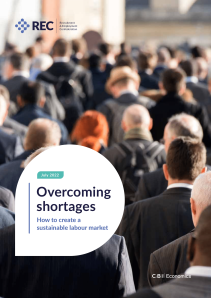

Labour shortages and workforce planning
HGV driver shortages resulting in long queues at petrol station forecourts; a lack of fruit pickers and butchers leaving produce and livestock in the fields; NHS workers overburdened and burning out during a global pandemic and air travel disrupted.
In the recruitment sector, these are issues that many of us saw coming. At the REC, we have been talking about the issues the British labour market faces for many years. And as we have seen over recent months, they have the potential to significantly damage the UK economy, our ability to invest and grow in the future.
The critical thing here is that while the pandemic has thrown the situation into sharp relief by causing a moment of crisis – the underlying issue has been with us for years. A smaller labour force as “baby boomers” retire, the inefficiencies in our skills system, years of sub-optimal performance in business investment, and deployment of technology and productivity, were always going to make the 2020s a challenging decade.
Much of this challenge lies with us in business to address – but we also need an environment that helps us make the changes we need, working with partners in colleges, local areas and government. In an environment where only growth can ensure we are able to both fund public services and maintain competitive tax rates, this is an area for urgent action.
In this report, we show exactly how much damage could be done if we don’t step up. With a 10% surge in demand for staff across the economy, and the labour market restricted by shortages, we could see a 1.2% fall in expected GDP and productivity by 2027 – costing the economy anywhere between £30 billion and £39 billion every year. This figure is just short of the entire current defence budget, or two whole Elizabeth Lines.
This report is about finding solutions, not complaining. We turned to businesses across the UK for their views, as well as looking to Canada and Germany for things we could learn. In truth though, the biggest step is the most obvious one – both businesses and governments need to change behaviour and put people planning at the top of their list, not deal with it as a cost to be minimised.
Many businesses talk about staff as their most important asset and the thing that drives their success. That means raising workforce planning up the agenda at C-suite level, ensuring your skills pipeline is getting you the people you need, participating in local and sector planning, and hiring people with a long-term view, rather than dealing with hiring as a procurement function. In 2022, REC members across the country have been advising firms on this.
For government, a proper labour market strategy is vital. Skills is part of that, but not the only part – immigration, devolution and labour market activation all matter. From buses and childcare infrastructure to apprenticeships – the entire business environment influences the investment decisions that firms make. It’s vital some unity of thinking is brought to this across the government.
labour market activation all matter. From buses and childcare infrastructure to apprenticeships – the entire business environment influences the investment decisions that firms make. It’s vital some unity of thinking is brought to this across the government.
To create a sustainable labour market and stoke economic growth we need to put the “people stuff” first.
- Neil Carberry, Chief Executive
The economic impact of labour and skills shortages
Business and policy recommendations

There is structural change in the labour market like we haven’t seen in generations. The research in this report was carried out by CBI Economics to demonstrate:
Business and government have a duty to overcome shortages. This report provides recomendations to support discussions between recruitment experts and their clients.
Download the overcoming shortages reportExisting theoretical and empirical literature highlights the negative effect shortages have on productivity, inflation and investment. These are all real-time issues affecting the UK. There is also a clear link between the need to address labour and skills shortages and addressing regional inequalities.
CBI Economics forecasts for the next five years point to anaemic growth and stagnant productivity.
This chart summarises the trends expected over the period to 2027 (More details are available in the full report, see Figure 1).
Our modelling analysis demonstrates that any attempts to boost demand whilst there are labour shortages will likely impact the economy negatively.
For example, a temporary and hypothetical 10% increase in demand in the economy would need to be accommodated by 1.7 million new jobs. Without this employment increase, real UK GDP would fall by between £30 billion and £39 billion every year from 2024 through to the end of 2027, equivalent to 1.2% to 1.6% of GDP, or the size of the UK recruitment sector in 2019.
This chart summarises the potential impacts of a temporary 10% uplift in demand in 2023 with and without additional labour shortages compared to the baseline.
Modelling analysis also shows that a demand boost in the face of shortages leads to higher earnings and inflation, and an overall fall in real disposable income, which in turn means restricted growth in public sector receipts.
Taken together, these findings show the significant economic impact of labour and skills shortages in the UK and highlight the need for urgent action to deal with the current staffing crisis.
If we don’t act now we won’t have a claim on the UK leading the charge as a powerhouse for growth, competitiveness, productivity and inclusion. Essentially we have to start putting people first. These interventions should be centred around plans to boost company performance, tackle labour shortages, raise skills levels and create better working environments for all.
Our recommendations are a first step towards achieving those goals.
Businesses are the key actors in delivering growth. It is their leadership on investment, inclusion and productivity that government intervention should be aiming to drive – with each pound of public money designed to catalyse private sector investment. But we should be clear – as a business community we have tolerated too much short-termism on the “people stuff” for years. Firms must play their part on skills, and finally behave as if people are their greatest asset – not just say it.
Increasing investment in skills isn’t effective unless it is targeted and integrated with the overall commercial growth plan. Any commercial long-term strategy should include a people plan which treats skills spending as investment rather than cost.
Most businesses know that achieving an equal, diverse and inclusive workplace is essential for commercial and ethical reasons. And we increasingly have examples in recruitment of candidates refusing job offers for companies that don’t demonstrate their EDI credentials.
Recruiters can be great partners in delivering this, especially in a tight labour market that will leave you behind if you don’t act to recruit and retain the best talent from all demographic groups available.
There has been a huge shift in how people work due to the pandemic, and this has triggered a broader conversation amongst employees and employers around flexibility. Employers need to deploy good employment relations skills. This debate cannot be ignored and instead should be embraced with active listening by deploying a range of engagement tools and negotiation with employees.
Salaries have increased in this tight labour market, but this isn’t the only answer to enticing new staff in a market where shortages are rife.
Create a proper plan for how to support and develop our labour market, tackling the forest of unlinked interventions coming from at least five different departments. Success should be measured by outcomes, and by the private investment that has been encouraged.
Here we outline our recommendations including on skills, immigration, regional investment and labour market activation more specifically.
While the skills systems of the four nations differ, all four need to improve their responsiveness to local needs, while maintaining high quality. Governments’ role should be to ensure that supply is available for business needs locally, and that the quality of that supply is high.
We should have an 'immigration for growth' policy approach.
Most importantly, the UK urgently requires an immigration route for workers at skill levels 1 and 2. Critical sectors such as construction, logistics, retail and hospitality are experiencing a severe shortage of staff at these levels and this demand cannot be met by the domestic supply of labour.
There are a number of opportunities that the government can provide to a wide range of marginalised groups who are currently excluded from the labour market. The government needs to review the current legislative and benefits framework, so they provide the right type of support to accommodate different people such as older workers, ethnic minorities, people with disabilities, young entrants to the jobs market and those with caring responsibilities.
REC CEO Neil Carberry and Campaigns Director Shazia Ejaz discuss the key highlights from our report: Overcoming Shortages' in this special episode of our Talking Recruitment podcast.
Share this article